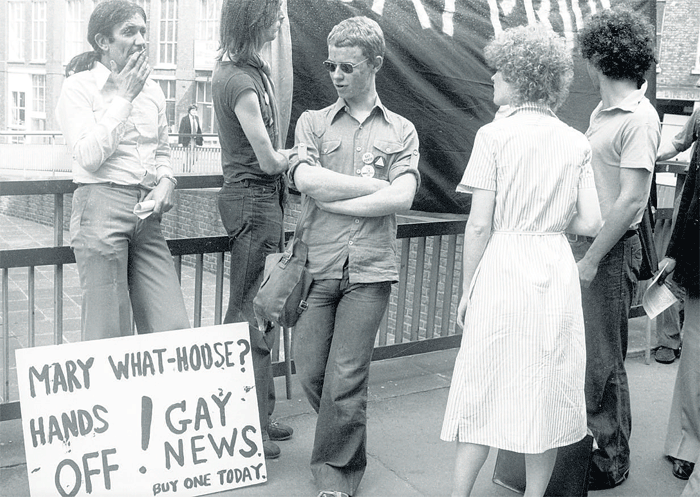The end of homophobic discrimination
Helena Pozniak looks at a movement that involved changing society rather than adapting to it

“We were just spectacular,” says Michael James, former drag queen and member of the 1970s’ Gay Liberation Front. “Visible, colourful, out loud, inventive, flamboyant and very, very funny.” It’s been 40 years since gay men and women put forward a radical notion – being gay wasn’t something to hide or apologise for, but rather something of which to be proud.
“We were just spectacular,” says Michael James, former drag queen and member of the 1970s’ Gay Liberation Front. “Visible, colourful, out loud, inventive, flamboyant and very, very funny.” It’s been 40 years since gay men and women put forward a radical notion – being gay wasn’t something to hide or apologise for, but rather something of which to be proud. This was revolutionary. In the preceding years, police had often turned a blind eye to violence against gay men or deliberately ensnared them. Lesbian, gay and transgender people could be sacked from jobs, arrested for kissing in the street, denied custody of their children and refused service in pubs. Medical experts still practised aversion therapy to “cure” homosexuality. Britain’s Gay Liberation Front, formed in the wake of a US movement after New York’s anti-homophobic Stonewall riots, was equally driven by ideals of freedom and innovation.
“Although GLF campaigned to end homophobic discrimination, equal rights were not our main focus,” says Peter Tatchell, former GLF member and human rights campaigner. He went on to help form OutRage!, which has attempted to continue the GLF radical tradition. “Equality was a far too limiting
agenda. We never wanted equal rights within the social status quo. We saw society as fundamentally unjust, and sought to change it, to end the oppression of queers – and of everyone else.”
Over the four years of its existence, many thousands of people attended the weekly GLF meetings held in the capital. “Hippies, activists, students,” recalls James, who brought along the urns from his Portobello Road cafe to provide tea at the meetings. “For me, it was a light coming on; as if the whole of my life had been leading to that moment. It cut me free from my last vestiges of guilt.”
While some pressure groups campaigned for legal reform, GLF veterans say they fought the battle for hearts and minds. Pioneers had a vision: a “live-and-let-live” sexual democracy.
“We didn’t believe changing the law was the answer. It could just as equally be taken away from us,” says GLF veteran Stuart Feather, who joined a London commune of drag queens and radical feminists during their nine-month squat in a London film studio. Members of this commune practised a new style of political protest against conformist gender roles – couched in humour and performance. “The commune was absolutely wonderful, something none of us had experienced before; it was bliss,” says Feather. “We were starting to explore sexism and did it through drag. We weren’t pretending to be women – we were men in frocks, working out what it meant to be gay men: no fake breasts. I found people’s liberalism went out the window when actually confronted by a man in drag. It was very empowering.”
Among the many subversive direct actions, or “zaps” as they were known, taken by the GLF, James remembers a sense of humour and invention. Protesters threw flour over Bob Hope at a Miss World competition, marched in upon a London radio station which broadcast anti-gay comments, organised sit-ins, locked London councillors overnight in a church hall, and performed impromptu acts of street theatre outside magistrates’ courts. The group organised telephone support, publications, awareness-raising groups. “We were right for our time,” says James. When “Have a gay day” became a nationwide catchphrase, the GLF chalked this up as a success – they’d organised “Gay days” in London parks.
The GLF disrupted a rally in 1971 organised by fundamentalist Christians campaigning for a more church-based morality. Backed by figures such as Mary Whitehouse, Cliff Richard, Malcolm Muggeridge and Lord Longford, the Festival of Light held an opening meeting in Westminster, lobbying for an end to “moral evils”including openly gay lifestyles. Protesters switched off the electricity, released mice and planted kissing “nuns” into the audience, sounded horns and unfurled banners. At another protest, James recalls being herded by police towards Trafalgar Square’s lion statues. “There was nowhere to go but up.” Caught by the police, he was carried “like a pig on a stick through the crowd”. Right-wing papers were outraged.
The GLF published eight demands for freedom, acceptance and rights – an interim manifesto en route to revolutionary social change. “They’re still valid,” says former GLF campaigner Alan Wakeman, who’s arranging for the original publication to be reproduced in larger typeface to celebrate the anniversary. “We’re all 40 years older after all.”
The GLF leaves a weighty legacy – a liberated, self-aware community, say campaigners. “Personally, we stopped feeling an inferior species,” said Wakeman. “Until then, we’d spent our lives being told we were bad.”
But the battle for equality has not yet been won, says Tatchell. Sixty five per cent of lesbian, gay and bisexual pupils have been bullied in Britain’s schools, according to a 2006 survey by the Schools Health Education Unit on behalf of Stonewall; while a 2008 survey found 38 per cent of the public believed homosexuality was “always” or “mostly” wrong. “Compared to GLF, most of today’s LGBT [lesbian, gay, bisexual and transgender] campaign groups are conservative and reformist,” he says. “The core message of GLF was that genuine queer emancipation involves changing society, rather than adapting to it. This requires nothing less than a full-scale cultural revolution, to overturn centuries of male heterosexual domination. Then, and only then, will queers and women be truly free.”
Join our commenting forum
Join thought-provoking conversations, follow other Independent readers and see their replies
Comments